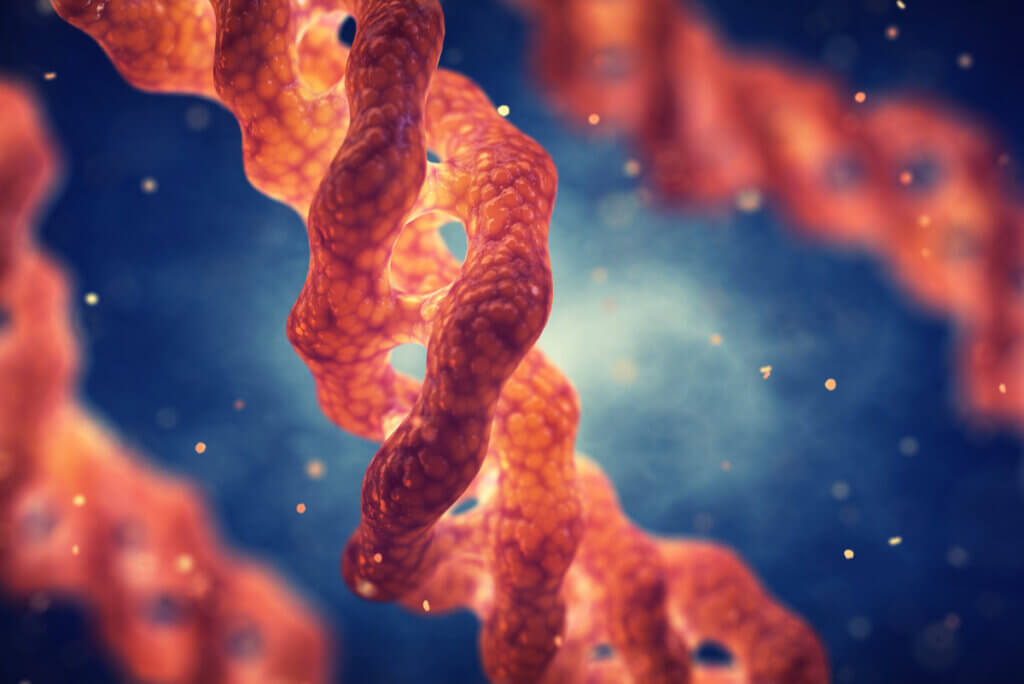The 5 Most Important Benefits of Taking Collagen

There are many benefits of taking collagen, a vital protein for the proper functioning of the body and the most abundant in vertebrates. It’s present in connective tissues such as bone, cartilage, muscle, skin, nails, and teeth.
Despite being so abundant, different factors can lead the body to stop producing it, causing joint pain, and opaque and flaccid skin. The greatest loss of collagen occurs after the age of 40, so it’s important to consume foods that stimulate its production or replace it.
In fact, in recent years the consumption of collagen supplements has become widespread, and it’s very common to find it hydrolyzed, that is, with its broken-down molecules. This makes it easier for the body to digest it and carry it to the tissues.
The 5 most important benefits of taking collagen
As we already mentioned, the intake of collagen has become popular, to the point of becoming a kind of fad. This is especially because it improves the appearance of the skin, positively impacting people’s aesthetic perception.

1. For the skin
Factors that promote oxidative stress on the skin, such as UV rays, smoking, and old age wear it down, making it look wrinkled and flaccid. This occurs, among other things, because the presence of type I and III collagen fibers, responsible for its strength and resistance, decreases.
Currently, several studies have shown that taking collagen peptides or supplements orally does reduce wrinkles. It has also been found that it can attenuate and prevent stretch marks and cellulite.
In fact, there’s evidence that the intake of hydrolyzed collagen is quite effective, since the intestine is capable of absorbing it and directing it to the skin and joints. This doesn’t happen with other types of oral treatment.
On the other hand, it was also found that its consumption stimulates the body to produce, by itself, collagen and other proteins that keep skin structure healthy, such as elastin and fibrillin.
2. Strengthens bone structure
Over the years, collagen deficiency can also affect bone structure, as most of the bones are made of this protein. Therefore, having good levels of collagen in the body helps to strengthen the bone structure.
It’s important to pay attention to the symptoms that indicate a lack of this protein in order to prevent chronic wear and tear on the bones that can lead to osteoporosis. This disease largely affects older adults and puts them at high risk for pathologic fractures.
At present, studies on the incidence of collagen consumption in bone strengthening continue to advance. Some have shown positive results in terms of reducing symptoms associated with osteoarthritis.
3. Prevents and relieves joint damage
Collagen consumption prevents joint damage by stimulating the creation of new cartilage cells. In people who already suffer from diseases such as rheumatism, arthritis, and osteoarthritis, it helps to relieve pain.
This was demonstrated by a study that took a sample of older adults. Those who consumed collagen for 70 days reduced their joint pain compared to those who didn’t. In this way, they were able to perform physical activity without any discomfort.
This is very positive, as joint pain also affects young people, even athletes, who can suffer wear and tear or injuries.
4. Prevents muscle loss
Collagen is found in almost the entire body. Therefore, among the benefits of its consumption we also find the strengthening of the muscles.
This protein influences tissue repair and helps when there are muscle contractions. Taking into account that, from the age of 25 or 30, 1.5% of collagen is lost, a supplement would be very favorable.
Experts are also looking into the hypothesis that the beneficial action of collagen on muscles is such that it promotes the synthesis of other proteins, such as creatine, which stimulates muscle growth after being subjected to physical training.
5. Strengthens the heart
Arteries and cardiovascular structure can be affected by collagen deficiencies. This weakness causes the onset of atherosclerosis, a disease that leads patients to the possibility of a heart attack or stroke.
Consuming collagen supplements also strengthens the heart, preventing the possibility of weakening the myocardial muscle mass, which can lead to improper functioning of this vital organ.
Other benefits of collagen
So far we have talked about the 5 most important benefits of taking collagen. We have prioritized them because they have solid scientific support. However, other probable benefits have also been identified.
Weight loss
Being a protein, consuming collagen once a day as a supplement at breakfast or snack time is believed to help keep the urge to eat under control.
So, by reducing that feeling of hunger outside of meals, it helps us to lose weight. There are also indications that it could increase metabolism, but specific studies are necessary to be sure of this.
Visual health
The cornea is made up of a large concentration of collagenous connective tissue. Therefore, it has been considered that the consumption of this protein could prevent diseases that may affect it.

How to take collagen?
As we already mentioned, taking collagen can prevent diseases and health problems, as well as alleviate them. When we consider the consumption of a dietary supplement such as hydrolyzed collagen, it’s better to consult a doctor.
However, the intake is very simple. This protein is characteristic of all animals and is present in most of their connective tissues. Therefore, by consuming chicken or pig skin, as well as its extremities, we are obtaining a good amount of it.
Other foods, such as beef or fish, also have a good concentration of collagen. Even though it’s common for people with protein deficiencies to be prescribed it, more scientific support is needed to define whether they have the same action as supplements.
Are there side effects of taking collagen?
There’s no evidence of side effects when taking collagen supplements. Even so, it’s important to know where the product we have chosen comes from. This is because some may be made with components we may be allergic to. This is the case with collagen based on shellfish, eggs, or fish.
There are many benefits of taking collagen, a vital protein for the proper functioning of the body and the most abundant in vertebrates. It’s present in connective tissues such as bone, cartilage, muscle, skin, nails, and teeth.
Despite being so abundant, different factors can lead the body to stop producing it, causing joint pain, and opaque and flaccid skin. The greatest loss of collagen occurs after the age of 40, so it’s important to consume foods that stimulate its production or replace it.
In fact, in recent years the consumption of collagen supplements has become widespread, and it’s very common to find it hydrolyzed, that is, with its broken-down molecules. This makes it easier for the body to digest it and carry it to the tissues.
The 5 most important benefits of taking collagen
As we already mentioned, the intake of collagen has become popular, to the point of becoming a kind of fad. This is especially because it improves the appearance of the skin, positively impacting people’s aesthetic perception.

1. For the skin
Factors that promote oxidative stress on the skin, such as UV rays, smoking, and old age wear it down, making it look wrinkled and flaccid. This occurs, among other things, because the presence of type I and III collagen fibers, responsible for its strength and resistance, decreases.
Currently, several studies have shown that taking collagen peptides or supplements orally does reduce wrinkles. It has also been found that it can attenuate and prevent stretch marks and cellulite.
In fact, there’s evidence that the intake of hydrolyzed collagen is quite effective, since the intestine is capable of absorbing it and directing it to the skin and joints. This doesn’t happen with other types of oral treatment.
On the other hand, it was also found that its consumption stimulates the body to produce, by itself, collagen and other proteins that keep skin structure healthy, such as elastin and fibrillin.
2. Strengthens bone structure
Over the years, collagen deficiency can also affect bone structure, as most of the bones are made of this protein. Therefore, having good levels of collagen in the body helps to strengthen the bone structure.
It’s important to pay attention to the symptoms that indicate a lack of this protein in order to prevent chronic wear and tear on the bones that can lead to osteoporosis. This disease largely affects older adults and puts them at high risk for pathologic fractures.
At present, studies on the incidence of collagen consumption in bone strengthening continue to advance. Some have shown positive results in terms of reducing symptoms associated with osteoarthritis.
3. Prevents and relieves joint damage
Collagen consumption prevents joint damage by stimulating the creation of new cartilage cells. In people who already suffer from diseases such as rheumatism, arthritis, and osteoarthritis, it helps to relieve pain.
This was demonstrated by a study that took a sample of older adults. Those who consumed collagen for 70 days reduced their joint pain compared to those who didn’t. In this way, they were able to perform physical activity without any discomfort.
This is very positive, as joint pain also affects young people, even athletes, who can suffer wear and tear or injuries.
4. Prevents muscle loss
Collagen is found in almost the entire body. Therefore, among the benefits of its consumption we also find the strengthening of the muscles.
This protein influences tissue repair and helps when there are muscle contractions. Taking into account that, from the age of 25 or 30, 1.5% of collagen is lost, a supplement would be very favorable.
Experts are also looking into the hypothesis that the beneficial action of collagen on muscles is such that it promotes the synthesis of other proteins, such as creatine, which stimulates muscle growth after being subjected to physical training.
5. Strengthens the heart
Arteries and cardiovascular structure can be affected by collagen deficiencies. This weakness causes the onset of atherosclerosis, a disease that leads patients to the possibility of a heart attack or stroke.
Consuming collagen supplements also strengthens the heart, preventing the possibility of weakening the myocardial muscle mass, which can lead to improper functioning of this vital organ.
Other benefits of collagen
So far we have talked about the 5 most important benefits of taking collagen. We have prioritized them because they have solid scientific support. However, other probable benefits have also been identified.
Weight loss
Being a protein, consuming collagen once a day as a supplement at breakfast or snack time is believed to help keep the urge to eat under control.
So, by reducing that feeling of hunger outside of meals, it helps us to lose weight. There are also indications that it could increase metabolism, but specific studies are necessary to be sure of this.
Visual health
The cornea is made up of a large concentration of collagenous connective tissue. Therefore, it has been considered that the consumption of this protein could prevent diseases that may affect it.

How to take collagen?
As we already mentioned, taking collagen can prevent diseases and health problems, as well as alleviate them. When we consider the consumption of a dietary supplement such as hydrolyzed collagen, it’s better to consult a doctor.
However, the intake is very simple. This protein is characteristic of all animals and is present in most of their connective tissues. Therefore, by consuming chicken or pig skin, as well as its extremities, we are obtaining a good amount of it.
Other foods, such as beef or fish, also have a good concentration of collagen. Even though it’s common for people with protein deficiencies to be prescribed it, more scientific support is needed to define whether they have the same action as supplements.
Are there side effects of taking collagen?
There’s no evidence of side effects when taking collagen supplements. Even so, it’s important to know where the product we have chosen comes from. This is because some may be made with components we may be allergic to. This is the case with collagen based on shellfish, eggs, or fish.
- Ferreira de Silva, T., Barretto Penna, A. Colágeno: Características químicas e propriedades duncionais. Rev Inst Adolfo Lutz. 2012; 71(3):530-9. Disponible en: https://repositorio.unesp.br/bitstream/handle/11449/122273/ISSN0073-9855-2012-71-03-530-539.pdf?sequence=1&isAllowed=y
- Valdés-rodríguez, R., Torres-Álvares, B., González-Muro, J., Almeda.Valdés, P. La piel y el sistema endocrinológico. Gaceta médica de México. 2012; 148: 162-168. Disponible en: https://www.medigraphic.com/pdfs/gaceta/gm-2012/gm122g.pdf
- Proksch, E & Schunck, Michael & Zague, V & Segger, Dörte & Degwert, Joachim & Oesser, S. (2013). Oral Intake of Specific Bioactive Collagen Peptides Reduces Skin Wrinkles and Increases Dermal Matrix Synthesis. Skin pharmacology and physiology. 27. 113-119. 10.1159/000355523.
- Borumand M, Sibilla S. Effects of a nutritional supplement containing collagen peptides on skin elasticity, hydration and wrinkles. J Med Nutr Nutraceut [serial online] 2015 [cited 2020 Nov 6];4:47-53. Available from: https://www.jmnn.org/text.asp?2015/4/1/47/146161
- Viguet-Carrin S, Garnero P, Delmas PD. The role of collagen in bone strength. Osteoporos Int. 2006;17(3):319-36. doi: 10.1007/s00198-005-2035-9. Epub 2005 Dec 9. PMID: 16341622.
- Ganceviciene, R., Liakou, A. I., Theodoridis, A., Makrantonaki, E., & Zouboulis, C. C. (2012). Skin anti-aging strategies. Dermato-endocrinology, 4(3), 308–319. https://doi.org/10.4161/derm.22804
- Murray, Mallory. El colágeno ¿qué es y cuáles son sus beneficios para la salud? Naturopathic Currents, Vol. 79 (Diciembre 2019), Artículo 2. Disponible en: https://bit.ly/38glSSE
- Imamura, Satiko Tomikawa; Imamura, Marta; Hirose-Pastor, Elda. Efeitos do envelhecimento e do exercício físico sobre o colágeno do músculo esquelético humano. Rev. bras. reumatol; 39(1): 35-40, 1999. disponible en:https://pesquisa.bvsalud.org/portal/resource/pt/lil-308780
- Figueres Juher, T. Basés Pérez, E. Revisión de los efectos beneficiosos de la ingesta de colágeno hidrolizado sobre la salud osteoarticular y el envejecimiento dérmico. Nutr. Hospi. 2015;32 (Supl. 1): 62-66. ISSN 0212-1611. Disponible en: http://www.aulamedica.es/nh/pdf/9482.pdf
- Zdzieblik, D., Oesser, S., Baumstark, M. W., Gollhofer, A., & König, D. (2015). Collagen peptide supplementation in combination with resistance training improves body composition and increases muscle strength in elderly sarcopenic men: a randomised controlled trial. The British journal of nutrition, 114(8), 1237–1245. https://doi.org/10.1017/S0007114515002810
- Lodish H, Berk A, Zipursky SL, et al. Molecular Cell Biology. 4th edition. New York: W. H. Freeman; 2000. Section 22.3, Collagen: The Fibrous Proteins of the Matrix. Available from: https://www.sciencedirect.com/science/article/abs/pii/S1470817501000236?via%3Dihub
- Cuesta, F. Matía, P. Desnutrición y corazón. Libro de la salud cardiovascular. Disponible en: https://www.fbbva.es/microsites/salud_cardio/mult/fbbva_libroCorazon_cap63.pdf
- Borumand, M., & Sibilla, S. (2014). Daily consumption of the collagen supplement Pure Gold Collagen® reduces visible signs of aging. Clinical interventions in aging, 9, 1747–1758. Disponible en: https://doi.org/10.2147/CIA.S65939
- Besabe Tuero, B. Funciones de la vitamina C en el metabolismo del colágeno. Rev. Cubana Aliment Nutr 2000; 14(1): 46-54. Disponible en: https://cmapspublic3.ihmc.us/rid=1GQ861HNG-L3S88S-LKM/VITAMINAS%20PDF.pdf
Este texto se ofrece únicamente con propósitos informativos y no reemplaza la consulta con un profesional. Ante dudas, consulta a tu especialista.







